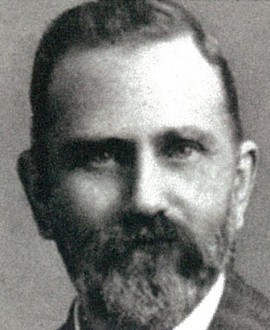Art Wilkinson’s occupation before he enlisted in the First World War was as a chauffeur. So it seems appropriate that he would find his way into the Motor Transport Section during the course of the conflict.
He was 27 when he enlisted in February 1916 – by which stage his VFL days were gone.
He had a dual reason for wanting to England. Having been born in Melton, Mowbray, in England, Wilkinson still had a belief in and a reliance on the Mother Country. But as an adopted Australian, eager to protect what rights and liberties this country possessed, he also felt a similar sort of passion for the new country that he had come to love.
Joining up might also provide a ticket home to see his family.
He listed his father, Frederick Wilkinson as his next-of-kin, even if he lived in South Staffordshire. And he assumed that even if he would fight in France, he might get the chance to cross the Channel one day to visit his relatives back home.
Wilkinson has spent some of his early years in Kilmore and came to play football there. He came to Melbourne and played with the Collingwood District Football Club in 1911, managing 12 games and kicking a goal. That was enough to win him an invitation to train with Collingwood seniors in the practice games for the 1912 season, and he managed to win a spot on the club’s playing list, impressing first-year coach Jock McHale.
He was selected for the Round 2 game against Essendon, named in the forward line, and although the Magpies would lose the match by 17 points, he would not only kick a goal but manage to keep his position within the team. The Herald was quite taken with his debut, describing him as "little Wilkinson" and likening his style to that of South Melbourne's Joe Prince. The paper also reported that Essendon great Bill Busbridge, by then in his final season as a player, was greatly impressed by Wilkinson's debut and felt he would make an even better rover, potentially being 'too cramped' up forward.
Overall it is fair to say that Wilkinson won plenty of plaudits for his debut campaign. He played 11 games, mostly as a small forward, and kicked eight goals, winning regular praise along the way. It was McHale’s first season as playing coach, and things had been difficult for the Magpies throughout the season, with a long injury list cutting deep. But Wilkinson's showings had seemed to be a bright spot. Despite that, however, he left Victoria Park at the end of the season.
He saw greater opportunities at Essendon, even if they did not eventuate. He could only manage two games for the Same Old – against Geelong in Round 6 and against Melbourne in Round 9 – and that was end of his time at his second VFL club.
Wilkinson enlisted like so many of those British-born Australians intent on making a difference on the front line.
He left Australia on the Afric on June 5, 1916. He would return in mid-1919; not quite the same ‘pocket marvel’ that had left Australia 37 months earlier, but a man who had done his part when asked to.
- Glenn McFarlane


